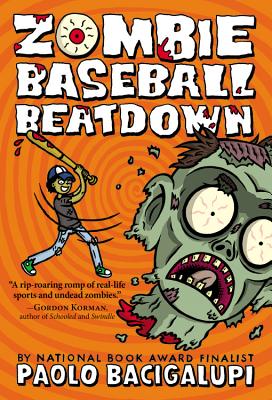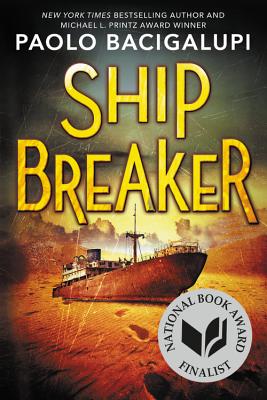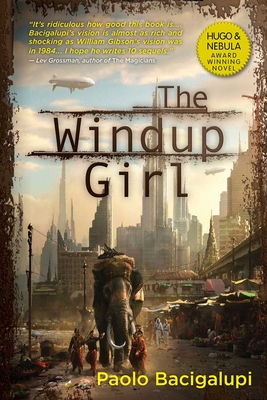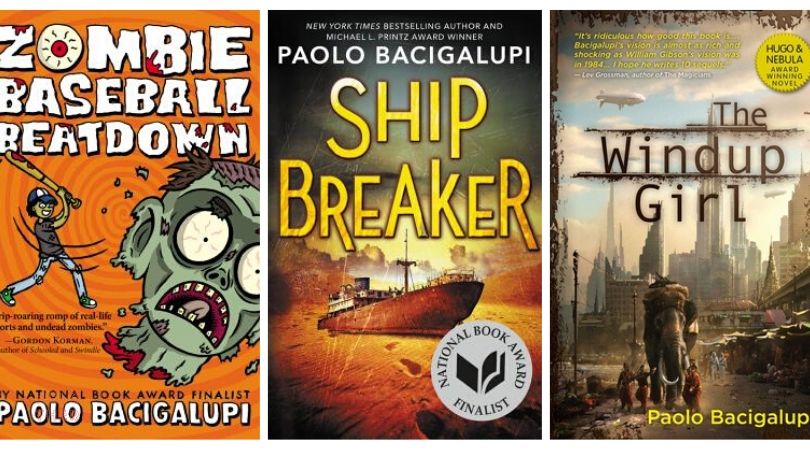craft review by Jen Jobart
I write books for kids because I want to remind them that they are powerful. That they can work together for the greater good. That they can change the world. Kids can be inspired by those types of themes, but only if they’re woven into a novel that they can’t put down. Kids don’t tolerate boredom. Heck, I don’t either, so I get it. My favorite kinds of books are the ones that I devour, but also that stick with me for a long time after I turn the last page.
Recently, I got interested in Paolo Bacigalupi’s books. Bacigalupi mainly writes for adult and YA audiences, but he does have one middle grade novel. Curious, I decided to read one of each and compare them. I made my way through Zombie Baseball Beatdown (MG), Ship Breaker (YA), and The Windup Girl (Adult). Bacigalupi’s writing is consistently phenomenal regardless of intended audience.
In an interview about The Doubt Factory (in the Kindle edition), Bacigalupi’s latest YA book, he says, “As for why I decided to write this for teens instead of adults–to me it’s just another example of the kind of world we adults are handing off to our young people. I feel like young people should see this clearly, and see us adults clearly. We tell them again and again that we have their interests at heart, and yet, here we are, fostering industries that make their futures worse.”
Bacigalupi takes his readers seriously, no matter their age.
When asked in the interview what he wants his readers to take away from that book, he said, “More than anything, I hope they’re entertained. But beyond that… I hope they’ll be moved to pay attention to the details of the world around them.”
Bacigalupi’s books read differently, depending on the target audience. Each of the books I read is well-suited to appeal to its intended audience; the number of high-profile awards these books have won indicates as much. But at the same time, he manages to get the same themes across in all of his books.
I decided to explore how he does that by writing this post, as well as a followup post. Here is an introduction to each of the novels:
Zombie Baseball Beatdown

Zombie Baseball Beatdown is a middle grade novel. It’s the story of a couple of kids who save the world from a Zombie outbreak at the local meat processing plant. I couldn’t put it down. My kids, who are 10, like funny page-turners. I like books that make me think. This is one of the few books we can agree on.
Zombie Baseball Beatdown won the 2013 VOYA Top Shelf Fiction for Middle School Readers Book, and was a 2013 Association of Booksellers for Children Best Book for Children, a 2013 Booklist Best Audiobook of the Year, a 2014 Children’s Book Committee at Bank Street College Outstanding Book, a 2014 ALSC Notable Children’s Recording, and a 2014 YALSA Top Ten Amazing Audiobook.
Ship Breaker
Ship Breaker is the first novel in a young adult series. Set in a world where climate change has wreaked havoc, Ship Breaker is the story of a teenage boy named Nailer. He leads a bleak existence scavenging parts from broken down oil tankers. He meets a girl from the other side of the economic inequality divide who changes his life forever.
It was a New York Times Bestseller, won the Michael L. Printz Award, was a National Book Award Finalist, VOYA 2010 Top Shelf Fiction for Middle School Readers Book, and Rolling Stone 40 Best YA Novels Book.
The Windup Girl
The Windup Girl is a novel for adults. It is definitely not suited for kids. The plot is complex, but overall, I would say that The Windup Girl is the story of what courage looks like in a world where everything has gone awry.
It won the Hugo and Nebula awards for best novel, as well as the Locus Award, the Compton Crook Award, and the Campbell Memorial Award. It was named one of the best novels of the year by Time, Publisher’s Weekly, Library Journal, Locus, and the American Library Association.
Common threads
Even though these three books are intended for totally different audiences, they address common themes. Clearly, there are some topics that Bacigalupi is passionate about, and these recur again and again in his writing. I thought it was fascinating that he was able to make the same themes accessible to different age groups on completely different levels.
Coverups
Bacigalupi’s books have a recurring theme of corporations using money to obfuscate what they are doing from the general public in order to promote their own best interests. He also examines what happens to whistleblowers who try to stop this from happening.
In Zombie Baseball Beatdown (MG), a food processing company knows that there is something wrong with the cows that they are processing, but they continue to sell hamburger regardless, arresting and deporting worker whistleblowers who get in the way.

In Ship Breaker (YA), operatives take over a company and attempt to make business decisions that go against the CEO’s ethics. When he refuses to allow this to happen, the operatives attempt to kidnap the CEO’s daughter in order to blackmail him into compliance.
In The Windup Girl (adult), a few key companies control the world’s food source. The story takes place in a future Thailand, where these company’s operatives influence the Thai government to make decisions that favor them, rather than the citizens of Thailand. Jaidee, a government worker who truly believes in his people, is eliminated because he is in the way.
Economic Inequality / Social Privilege
Bacigalupi uses his characters as a proxy to examine how economic privilege plays out.
In Zombie Baseball Beatdown (MG), Mexican plant workers are expected to work harder than is safe and get deported if they dare open their mouths about the working conditions at the factory. Sammy’s dad runs Milrow Meats, and with one phone call and the right connections, gets Miguel’s dad deported. This power struggle is mirrored in the tension between Sammy and Miguel, especially when Miguel mows Sammy’s lawn to contribute to his family’s precarious financial situation.
In Ship Breaker (YA), Lucky Girl wears gold and has a ship full of refrigerated steaks, while Lucky Boy wears work tattoos and eats rat on a stick when he can get it.
In The Windup Girl (Adult), disease has wiped out much of the world’s food supply. A couple of giant corporations in the US midwest have a monopoly on the entire world’s calorie intake with their SoyPRO and TotalNutrient Wheat products. They use blackmail and bribes to make sure that any new scientific discoveries and research advance the interests of their own companies.
The interests of the white-led first-world corporations trump the interests of the Thai people, even in Thailand. The working-class Thai people bear the brunt of the fallout of the tension between factions, even though the far-away-shareholders have the most to gain.
Genetic engineering
Bacigalupi likes to examine the possibilities of genetic engineering–and what happens when things don’t go as expected.

In Zombie Baseball Beatdown (MG), the cows are being injected with Milrow Bovine Growth Supplement to make them fatter. Unfortunately, these chemicals have the side effect of turning the cows into zombies, and turning the people that eat the cows meat into zombies as well.
In Ship Breaker (YA), there are half men, half dogs who have been bred for war. They have genetics from humans, dogs, tigers, and hyenas. They are trained for obedience, but not all of them follow their training.
In The Windup Girl (Adult), the Japanese people have created a new version of human by combining DNA from canines and other animals. These humans are super strong, super fast, and invulnerable. They are trained for obedience to a single master, and they usually are loyal, but not always.
Up Next
Jen Jobart writes middle grade fiction and is always sending characters she loves on dangerous adventures. She is an active member of the SCBWI and has studied writing for children through Stanford’s Continuing Studies program. When Jen’s not writing, she’s outside gardening and raising chickens at her home in the San Francisco Bay Area. Find her at www.jenjobart.com.


COMMENTs:
0